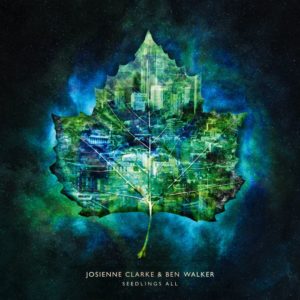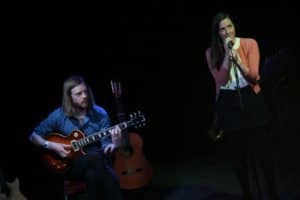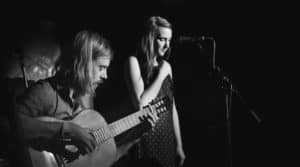Josienne Clarke: The 13th Floor Interview
English folk duo Josienne Clarke and Ben Walker release their sixth album today, titled Seedlings All.
The twosome has been recording together since 2010 with Josienne handling most of the vocal duties and songwriting while Ben plays a myriad of instruments and arranges the tunes.
Seedlings All is the duo’s first long player to feature all original songs. The 13th Floor’s Marty Duda spoke to Josienne Clarke just a few days before the new album was due to be released. It turns out they were in Australia for a little pre-release tour. The interview begins with a little jibe at them for not coming to New Zealand…
Click here to listen to the interview with Josienne Clarke:
Or, read a transcription of the interview here:
MD: I have to give you a hard time for not coming down to New Zealand while you were down in the vicinity.
JC: Yeah, sorry about that, but we’ve got to get back to London to launch the album in the UK. Otherwise, we’d have carried on down.
MD: What’s involved in launching the album? Do you have a showcase gig, and things like that, lined up back in the UK?
JC: Yeah. We’ve got an in store for Rough Trade Records, and then we’ve got a UK tour and interviews, and stuff, to do over there.
 MD: Seedlings All is your sixth album. Is that correct?
MD: Seedlings All is your sixth album. Is that correct?
JC: Yep, that’s right.
MD: And I think, possibly, I may be wrong, folks in New Zealand may look at you as an unknown quantity, and not be completely familiar with you, even though you’ve been doing it for a while; so, I’ll just ask you some, probably, relatively elemental questions to find out more about you. I’m curious as to… what it is, musically, that keeps you and Ben together? Is there a musical glue that holds you together?
JC: Yeah, I think so. We’re quite opposite characters, in a way. Ben’s a very clear, technical thinker, who loves a spread sheet – really good with his musical theory – and I’m a bit more wordy, and a bit blah. It’s the complete opposite skill sets that fit together really well. We both have – in a venn diagram of our interest in music – we’ve got a lot of stuff that overlaps, but he’s got all this interest in electronic music, that I don’t really know about, and I’ve got classical and jazz influences that he doesn’t always share. It’s the balance of familiar and unfamiliar that keeps us together, I think.
MD: I know that you’re known as a folk duo. Do you go along with that tagline? Does that seem to fit what you do, do you think?
JC: I think that that element is definitely there. I think Ben and I find it a little bit restrictive sometimes, because we have quite wide interests in music, and we definitely try to bring in elements of other things; but I think, probably, that’s a fairly good general area to put us in, certainly. We do do traditional folk material, but that’s not all of what we do.
MD: Kind of a jumping off point, I guess.
JC: Yes.
MD: The new album is all original material…. Is that a first for you guys?
JC: Yeah, sort of. I did a sort of solo record in 2010, that was fourteen original songs –although, Ben played guitar and had done string arrangements on it; so, he was there – and then, subsequent to that, we always mixed in traditional folks songs or covers with what we were doing, and we’ve built up a reputation for playing other people’s music, mostly, and mixing in some of our own, and I guess we felt we’d got to the point where we could present entirely original stuff.
MD: The album leads off with a song – which I think was the first single – called Chicago. It’s a great tune! I was really taken by it when I first heard it. I was hoping you could tell me a little bit about what was the inspiration, where it came from… how it came about.
JC: Ben and I did our first US tour last year, and I guess like a lot of British musicians we had an idealised idea of what that would be – imagining something like the big stadium, or something – so, we had some really great gigs, but we had some really challenging ones as well, where we realised where we hadn’t made an impact, at all, on such a massive country; and in retrospect, that seems kind of obvious. So, we’d driven all day to get to Chicago, and we had five minutes at our hotel to drop off our bags. Then we had to drive another hour into the centre of Chicago to sound check; and we did, and that was all fine, but then nobody came to the gig; not one person. It was a bit of a reality check. We had the support act that night, who, despite being local, didn’t appear to have any friends; so, they didn’t bring anyone either, and it was one of those moments where you go, “Do we do this anyway? Does the gig go ahead?” and we’re sticklers for a contractual obligation; so, we did do it. And the violinist from the support band came up to me and Ben afterwards, and he said, “I think an hour set’s a bit long for your music, because it’s the kind of music that you have to listen to and think about, and it’s Saturday and nobody really wants to do that.” So, I was sitting at the bar with my quadruple bullet bourbon, thinking, “I’m not going to do this anymore. Forget this! The world isn’t made for my gift,” and then I realised that I was being a bit of a diva… and so, I kind of wrote that song to have a bit of a word with myself about getting ideas above my station; that you have to keep your expectations low, and your enthusiasm high.
MD: I think anyone would be disheartened if they were suddenly to drive into a city of several million people, and find that nobody showed up; so, you probably had every right to feel that way.
JC: But we went through all that in the UK. We’ve done it before; it’s just that I’d forgotten, because we’d been lucky enough not to have that situation, and I’d forgotten that you will have those sobering moments, and you’ve got to roll with the punches.
 MD: And that hasn’t happened in Australia yet, I assume.
MD: And that hasn’t happened in Australia yet, I assume.
JC: No. We’ve been pretty lucky so far.
MD: Oh, excellent. I believe you supported Richard Thompson last year, and I would imagine he, probably, could give you some pointers to how to deal with being on the road and audiences. He’s been doing that close to fifty years now.
JC: His whole adult life, really. That was an amazing experience. He was performing solo – he was doing ninety odd minutes of just him and a guitar. It’s amazing to watch somebody make such a variety of sounds with just one guitar and one voice. Yeah, that was an amazing tour to be on, and we’re very lucky that he chose us to do it.
MD: Was he giving you any pointers along the way?
JC: No! He’s a man of extremely few words. He’s incredibly nice, but also quite shy. I think I, probably, could count on one hand the words he said to us… “hello”. He did give us a nice hug at the end of the tour, though; so, the emotion was there, but not the words.
MD: Yeah. I guess he speaks through his guitar, for the most part.
JC: Absolutely. I thought I learned loads just from watching him perform every night, but you’ll not get a whole sentence out of him.
MD: I think I read somewhere that you’re a fan of Joan Baez, or at least you were at some point. I was wondering if you’d heard her most recent album – the one that’s going to be one of her last records – and if you had any thoughts about it.
JC: No. I was reading a review of it online, but I’ve yet to hear the full album; I can’t wait. I learned my first folk song from a Joan Baez record. It was Lily Of The West; and I went out and performed it, and people said, “You sound a bit like Joan Baez, but you also sound a bit like Sandy Denny.” That’s where my opening into folk music began; so, I owe Joan Baez a lot in terms of showing me, both in the States and in the UK, what the folk revival had to offer.
MD: Being somewhere in between Joan Baez and Sandy Denny isn’t a bad place to be, I guess.
JC: Yeah! Vocally, I try to be June Tabor at the bottom, Sandy Denny in the middle, and Joan Baez at the top.
MD: Nice…! Is that something that you gave a lot of consideration to, or is that how your voice just normally is?
JC: I think I always had very clear ideas about how I wanted to sing, and I’m very into singing with your own voice, but there’s certainly a timbre that I share with those singers in certain ranges; and you can do worse than listen to them sing and learn from their vocal techniques. Yeah, I guess, vocally, I owe a certain amount, but, hopefully, not too mimic.
MD: You don’t want to be too derivative, no; definitely not. Another song that I was hoping you could touch on is Bathed in Light.
JC: Performing is difficult, and there are some people that can take it completely in their stride, and then there are those of us who suffer, on and off, with hideous stage fright; and I’m one of the latter. There’s always that thirty seconds before the first note in any gig. The lights are on you, and the audience is silent, and waiting for you to sing; and in that thirty seconds, I’m always asking myself the question of, “Why do we put ourselves through this?” “If we go horribly wrong in front of all of these people…” and so, Bathed in Light is the narrative that goes through my head in that thirty seconds. It’s like being acutely aware of my own heart beat, and then all of my doubts about how this career could go horribly wrong, and then the third stanza of, “Well, what else would we do anyway? It’s too late to change our mind. We’ve got to get on with it,” and then after he first notes two or three, I love it again anyway. It’s kind of like in my inner monologue.
MD: What about Ben? Does he go through the same thing, or is he more assured on stage?
JC: Yeah, he’s a more consistent character. He doesn’t speak on stage. He’s very articulate through the medium of guitar instead; and so, the separation, for him, between performing and practicing isn’t quite as stark, and he seems to take it in his stride. I don’t think I’ve ever seen him drop a note in practice or performance. He’s just cool.
MD: All of the interaction with the audience is up to you then. Is that right?
JC: Yeah. He makes a few looks at them occasionally, but largely, he’s doing his thing, technically, and I’m the mouth piece for…but then we have our very clearly defined skill sets, as I mentioned earlier…. He’s got three or four guitars, and he’s using several tunings on each of those; so, he’s really busy getting technical things together. He’s using a loop station in one of the songs now, and he’s got a drum machine, and he’s got an amp and an electric guitar; so, he’s, technically, got a whole thing going on there, and I’m talking and creating space while he’s…
MD: …Twiddling knobs and setting stuff up.
JC: Yeah! Yeah, that stuff makes noise; I don’t really understand more than that.
MD: Do you ever play with other musicians as well, or is it just the two of you?
 JC: On the records, we tend to have more instruments, because it’s one of the few places that we can afford to take our ideas outside of the two of us. Ben is an arranger as much as he is a guitarist; so, he has ideas beyond what he has hands and fingers for – He does string arrangements, and he sketches out piano parts – so, probably, the UK tour will be taking a pianist, a double bass and a drummer, to fill out the sound here and there. There’s still lots of space in it, because it’s us, but he’s got little ideas that he’s put over various instruments.
JC: On the records, we tend to have more instruments, because it’s one of the few places that we can afford to take our ideas outside of the two of us. Ben is an arranger as much as he is a guitarist; so, he has ideas beyond what he has hands and fingers for – He does string arrangements, and he sketches out piano parts – so, probably, the UK tour will be taking a pianist, a double bass and a drummer, to fill out the sound here and there. There’s still lots of space in it, because it’s us, but he’s got little ideas that he’s put over various instruments.
MD: So, the songs come from you, and then you hand them over to Ben to give them the final polish. Is that how it works? What is the communication like between the two of you?
JC: Yeah. So, I’ll have the basic words, melody and the very fundamental chord progression – so, the basic skeleton of the song – and then I’ll take it to him, and he’ll put a proper guitar part on it – because I tend to do something fairly basic and strummy, and then he’ll do something that’s got a bit more inherent melody in it – and then he has string ideas, or he uses a couple of electronic things sometimes. He describes it as creating the frame for the song; like the painting… and then he frames it.
MD: Does the frame always match the painting, in your opinion?
JC: It does in the end. Some of the beauty of it is the back-and-forth – the wrangling and arguing about what doesn’t work – and that’s part of the process. So, in the end, yes, but not always, initially, no.
- Adam Hattaway & The HauntersJuly 25, 2024Wine Cellar (13th Floor Concert Review) - July 26, 2024
- New Music Friday: 13th Floor New Album Picks: July 26, 2024 - July 26, 2024
- Holly Arrowsmith – Blue Dreams(Leather Jacket Records) - July 25, 2024
